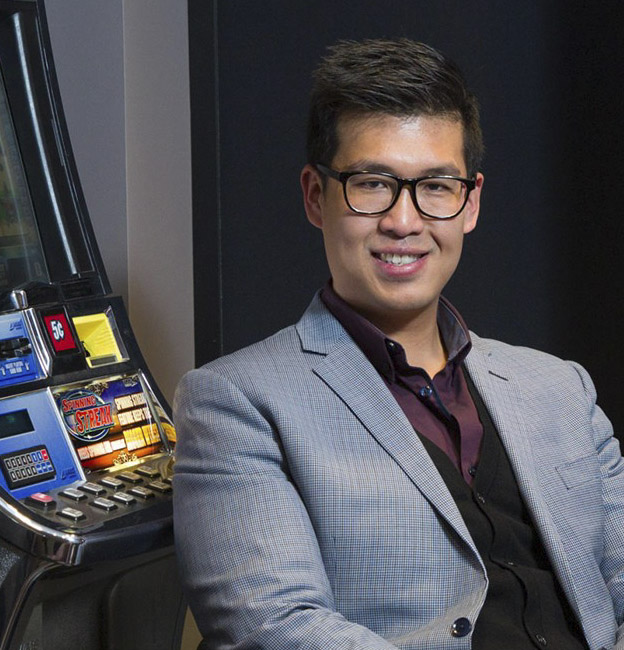
Dr. Andrew Hyounsoo Kim

Dr. Nassim Tabri
Dr. Andrew Hyounsoo Kim and Dr. Nassim Tabri , Addiction Psychology Section
Addiction Psychology covers a lot of ground, from substance use to video games. Today’s Psychology Month feature talks to Dr. Andrew Hyounsoo Kim and Dr. Nassim Tabri about the work they’re doing in the field of addictions, and about combatting the stigma that remains around the subject.
“I’ve never had a client when I ask them what brought them in here today say ‘I wanted to become addicted, so here I am’. That has never happened.”
Dr. Andrew Hyounsoo Kim is an assistant professor in the department of psychology at Ryerson University and the Chair of the Addiction Psychology Section at the CPA. A clinical psychologist (Interim autonomous practice), Dr. Kim completed a residency at Royal Ottawa Substance Use and Concurrent Disorders unit. He points out that no one starts out using substances or engaging in a behaviour with the goal of doing it to the degree that it’s going to interfere with their functioning.
Almost everyone has tried alcohol and other drugs. There are few Canadians who have not placed a bet or played an online video game. Some folks end up doing these things in an excessive sort of way, or engage in them more often and for longer periods of time than do others. But very few people develop an addiction. We all make the choice to try some of these things and might make the choice to continue doing them to some degree – but no one chooses to become addicted.
Addiction is one of the most highly stigmatized mental health conditions. In an effort to move away from that, and to create a greater understanding among the public, there has been a real shift over the past decade to move away from stigmatizing language. Researchers and clinicians in this field no longer use the words ‘dependence’ or ‘abuse’ but rather refer to ‘substance use’. Dr. Kim says,
“We no longer use the word ‘addict’. Instead we say, ‘a person experiencing an addiction’. We don’t use the word ‘junkie’, and even ‘clean’ is no longer in our vocabulary because those words are laden with negative meaning.”
The word ‘addiction’, in and of itself, is widely used – and widely misused – in society in general. We tend to use it to describe anything that people will engage with for a long period of time.
“Think of all the ads you’ve seen that say something like ‘this TV show is really addictive’ or ‘I’m addicted to this game’. People use the term a lot, without really knowing what it means. Addiction has a very specific meaning that is far more nuanced than just an activity someone engages in for long periods of time. It encompasses not just the biological (the brain) but also behaviour, emotions, thoughts, and the consequences that come about as a result of it.”
In addition to misuse of the word, there remain a lot of misconceptions about addiction itself – that it is a moral failure, or a personal choice, and that becoming addicted is an indication of a lack of character. Dr. Kim continues,
“At the very beginning when you’re starting to engage in an addictive behaviour there is of course a personal choice. But over time, it becomes a lot more complex than just lack of free will. There are changes that occur in the brain and to a person’s emotional and psychosocial context and it really moves away from being something a choice to a compulsion – that they engage in it even if it is no longer pleasurable. If all it took to stop was for us to say ‘stop using’, clinical psychologists who specialize in addictions wouldn’t have a clinical practice. Addictions are much more complex than just stopping.”
Dr. Nassim Tabri is an assistant professor of psychology at Carleton University. His research is focused on addiction and mental health, particularly the transdiagnostic factors that are present across a range of problematic behaviours such as gambling and disordered eating.. He says,
“In thinking about what constitutes an addiction, and how one can potentially develop an addiction, think of it this way. You try alcohol for the first time, or you pick up a video game and start playing. It doesn’t necessarily mean that a person who tries these things that have high addiction qualities will end up developing an addiction. Addiction happens when they persist in these behaviours, even though the fun has been taken out of it. Now it’s about doing it because you need to do it to function more so than because you’re enjoying it, and because not doing it makes you miserable.”
Addiction psychology is a vast science, touching on virtually every aspect of our connected lives. Ads, games, phones, and more are designed using principles derived from that science. But there is a definite threshold to behaviours that constitute addiction – it’s not an exactly defined threshold, in that it might be a little different for each individual experiencing addiction, but it is a pretty high bar in terms of the activity, or substance use, or behaviour affecting that person’s life. Dr. Tabri says,
“’Addiction’ is a term that should be reserved for an extreme condition. When you see ads, or gamble, in a way they’re nudging you to engage in a certain behaviour. Whether someone develops an addiction or not really depends on their risk profile (biopsychosocial risk factors). Milder engagement in these activities, even though you’re being influenced, doesn’t merit the term ‘addiction’.”
I haven’t touched my phone in about two hours. I pick it up and scroll through the notifications – CBS Sports wants me to know that the Denver Broncos have hired Green Bay’s offensive co-ordinator Nathaniel Hackett as their new coach. The Flipp app would like me to see the new deals available this week at Loblaws. My little mobile game wants me to know my lives have been refilled, Shoppers Drug Mart is very worried that I might miss out on my chance to get 10,000 Optimum points by spending $40 in their store, and Twitter has sent me eight notifications about eight new followers I’ve picked up today.
While not necessarily the work of psychologists who specialize in addiction, all these notifications are informed by addiction psychology. All are designed to provoke a response from me, to get me to interact with the app, the store, or the content in a way that maximizes my time on my phone and (by extension) minimizes my time doing other, presumably more productive but less immediately engaging, things. While these things are created and informed by addiction psychology, the fact that they influence me does not mean that I am “addicted” – there is a certain threshold for the use of that term, and until I forego sleep, skip meals, and leave work four hours early to play Words With Friends, I have likely not crossed that threshold.
Dr. Kim says,
“There are principles being used that increase the likelihood of addictive type behaviours on your smart phone. Things that increase the time on the device. Making it more engaging, sending notifications. With video games in particular, things like leader boards, or ‘here’s a special offer today – for only $1.99 you can get extra lives’. Gambling is another example - psychological knowledge and principles have been used to develop slot machines, to make it more likely that people will stay on the device for longer periods of time.”
While the psychological principles of addiction can, and have, been used to create addictive behaviours that sometimes result in an addiction, psychologists who specialize in this field tend to work on the other side of things. They’re focused on prevention and treatment. They’ve created the low-risk drinking guidelines, low-risk gambling and cannabis guidelines, the theories behind Smart Serve certification, and harm-reduction initiatives like safe injection sites. It’s here where psychological knowledge is applied directly to reduce the harms that some of these substances or behaviours may have. Says Dr. Kim,
“Psychology is the scientific study of the human mind and behaviour. So Addiction Psychology in that sense is using psychological scientifically sound methods to better understand why some people may use substances to the point of addiction, why some people may become ‘addicted’, if we use that word. It’s also trying to better understand the effects of substances and other addictive behaviours on the brain, and for me – what I find most interesting – is how we develop interventions, treatments, and preventions so we can reduce the harms and suffering for people who are living or have lived with addictions.”
When we hear the word ‘addiction’, we tend to think of addiction more in relation to substances than to behaviours. Cigarettes, alcohol, the opioid crisis are all top of mind when it comes to addiction – but are those type of addictive behaviours the same as, say, gambling or video gaming? Dr. Tabri says…not necessarily.
“One thing we focus on is the brain. I have a whole lecture talking about the dopamine reward system. I think there is an understanding in the general public that addictive behaviours have similar influences on the brain in terms of hijacking the dopamine reward system. The idea is that you’re no longer engaging in other activities that are meaningful and make you feel good, instead you’re doing this one thing that makes you feel really good at the expense of all the other things in your life.
But are all addictions one and the same in the brain? Not necessarily. The lay theory was once that it’s all dopamine, and that underpins everything. That started with research with rats in the 50s, and the story took hold because it was an attractive one. It grew into the idea that dopamine can explain all kinds of addictive behaviours. But when you look at the literature, what it says is that dopamine is really good at explaining something like alcohol, for example, or nicotine to some extent. But other addictive behaviours like cannabis, not so much. There’s more nuance and complexity going on than just dopamine. It may play a role, but it’s not the end-all and be-all in the brain.”
The science of addiction, and the psychology behind it, is ever evolving as we learn new things and approach them in a different way. Just as we have evolved in the terminology we use around mental health, substance use, and people experiencing addiction, we have instituted many programs, campaigns and initiatives to reduce harms and reduce stigma. Through it all, many things remain true – the most important being:
No one chooses addiction.
